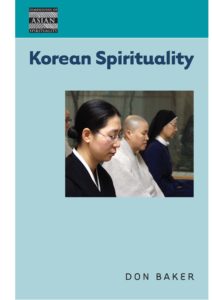 BY DON BAKER
BY DON BAKER
UNIVERSITY OF HAWAI`I PRESS, 2008
151 PAGES
ISBN: 978-0-8248-3257-5, PAPERBACK
Reviewed by Mary E. Connor
Korean Spirituality by Don Baker, a professor at the University of British Columbia, is an accessible and engaging guidebook to the distinctive religious and philosophical belief systems on the Korean peninsula. Its value is manifold. Because Korea has one of the most vibrant and diverse religious cultures of any nation in the world, lucid exposure to its beliefs and practices provides a model of how adherents of diverse faiths can get along harmoniously. An examination of Korean spirituality illustrates how differing religions can inspire and even modify one another when there is tolerance among the faithful. Korean Spirituality also helps us deepen our understanding not only of the Koreas, but also of the Koreans who live in the United States.
Don Baker defines spirituality as “attitudes and actions grounded in the belief that there are invisible forces more powerful than we are, and that through interaction with those forces we can better ourselves or make our lives more pleasant or meaningful” (5). He assert s that South Korea provides a foundation for studying modern spirituality because of the number and variety of religious and spiritual or philosophical beliefs that the people draw on to address the challenges of life. The many buildings for religious rituals, which have increased 500 percent since 1960, offer architectural evidence that the people of South Korea are highly religious. Yet even with this growing religious fervor, only slightly more than half of the population professes a specific religious orientation (3). South Korea could be the only country with an ethnically homogeneous population in which the Buddhists and Christians are close to being equal in number. South Korea may also be the only industrialized nation where folk religion continues to exist and remains independent of any institutional control. Even those who considered themselves good Christians are still influenced by a folk tradition that is deeply embedded in the culture. In spite of differing beliefs and religious practices, these Koreans assume that they have to align themselves with some power greater than their own in order to overcome the limitations that they face as individual human beings. This assumption unites their approach to spirituality.
This book surveys folk religion and animism, Confucianism, Buddhism, Daoism, Christianity, and what he calls the new religions, such as Wŏn Buddhism. Baker analyzes the roles that religions have played in the past, identifies their commonalties, and explains how traditional Korean spirituality was primarily based on ritual and concerned with ethics. What p eople did was more important than what they believed, and their rituals emphasized the group, such as the family or the village. He notes that with Christianity, doctrine is emphasized and that the people enter “a personal relationship with that God above the individual’s relationship with his or her family, neighbors, or government” (62). In the final section of Korean Spirituality, the author examines spirituality in North Korea and how it is grounded in the political ideology of juche—the only form of spirituality available to the overwhelming majority of North Koreans.

